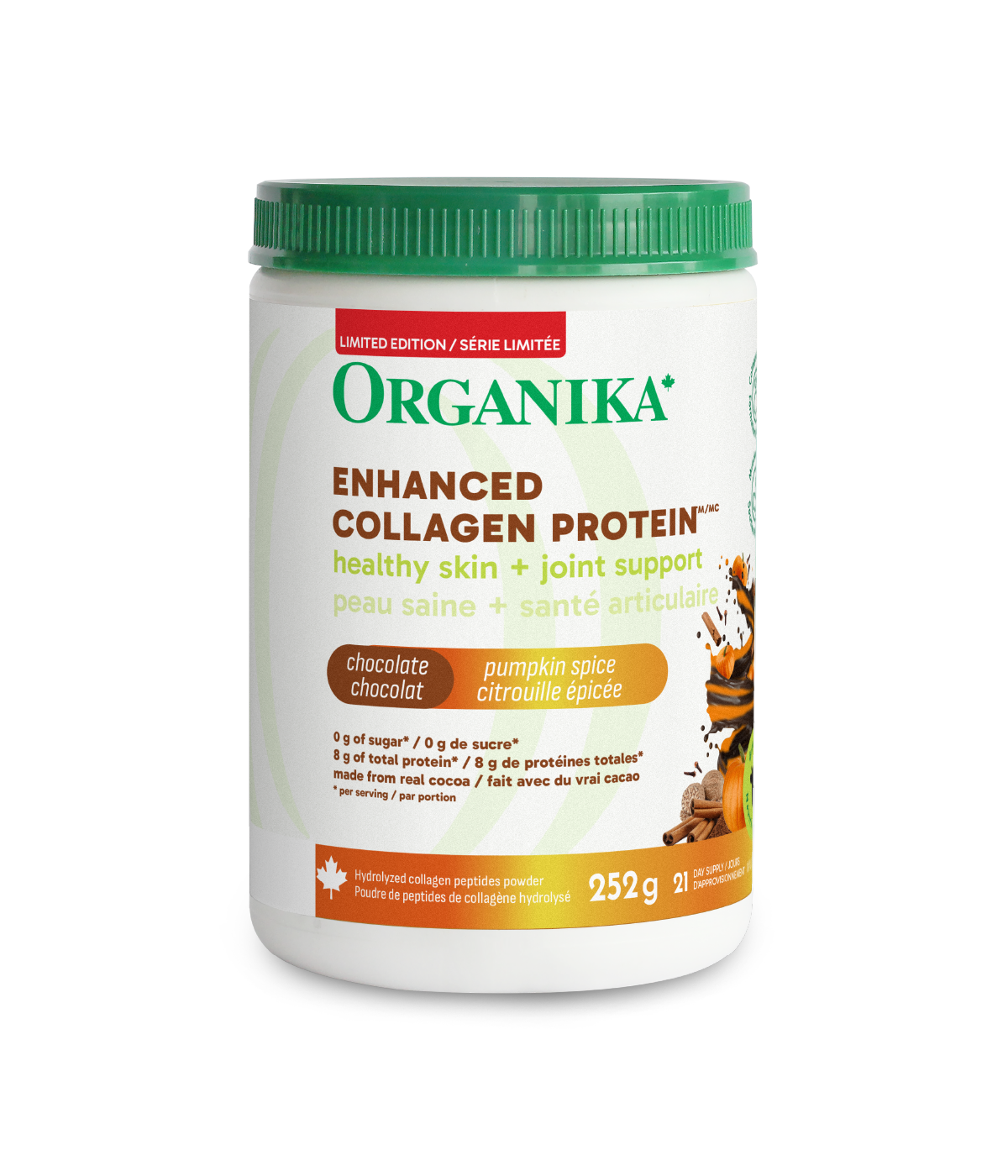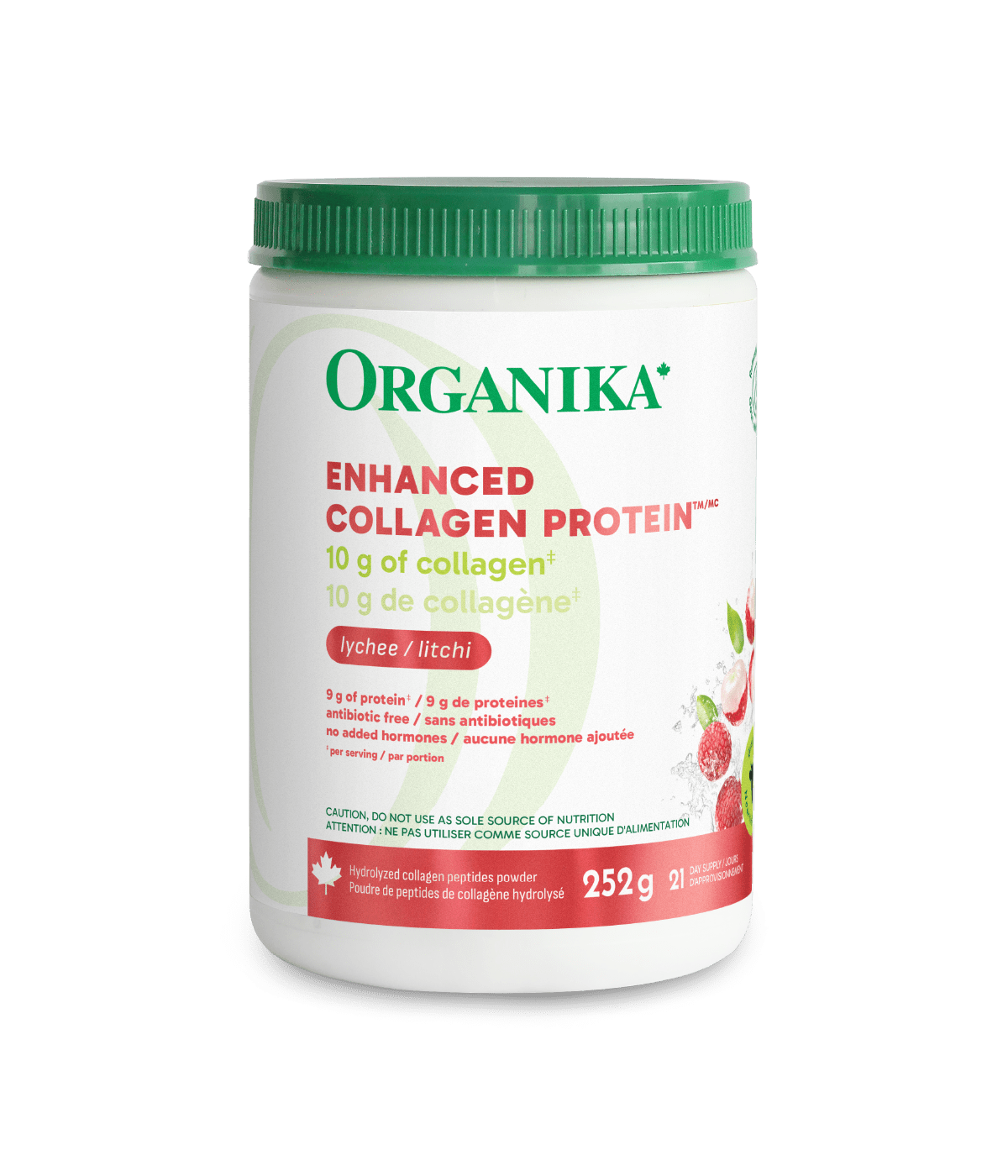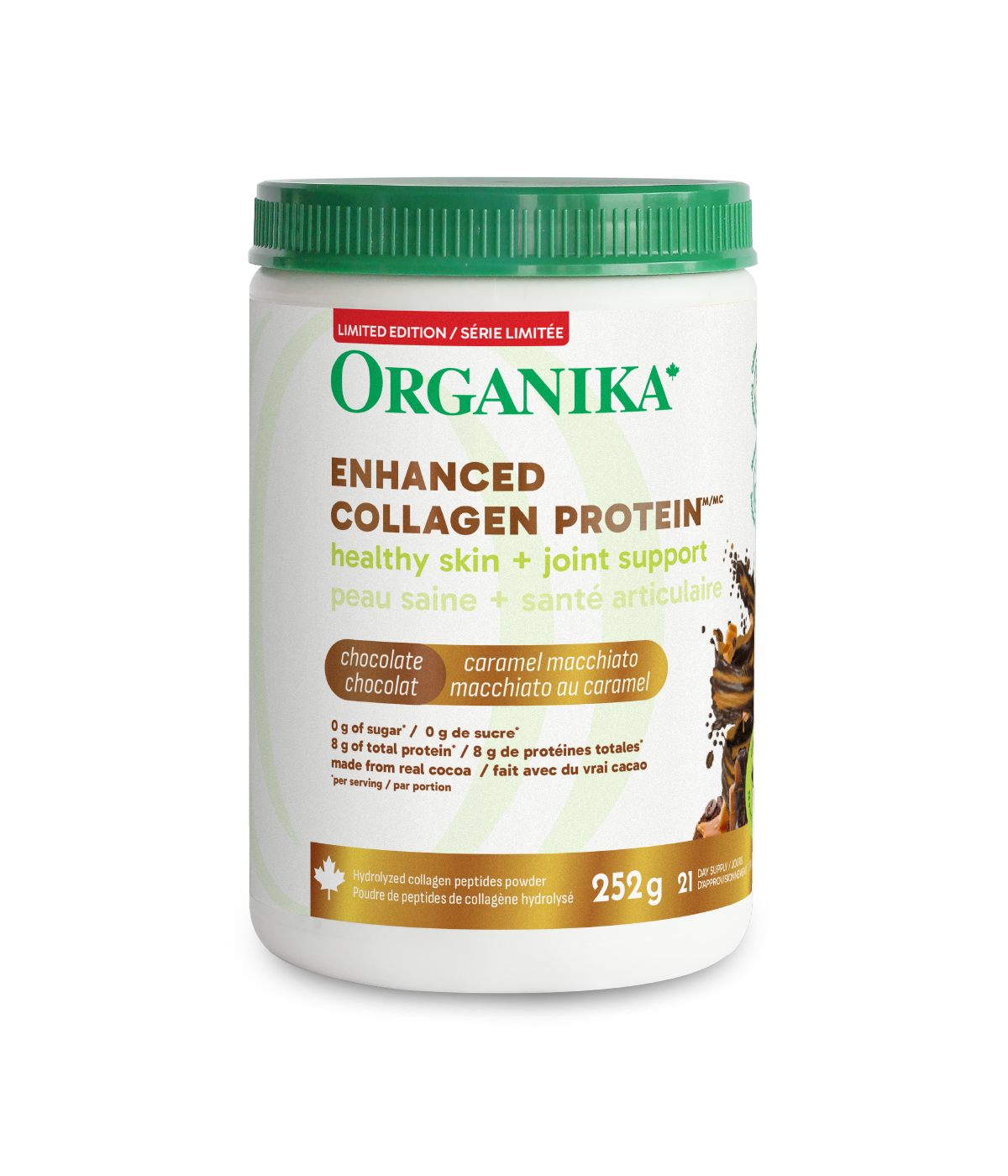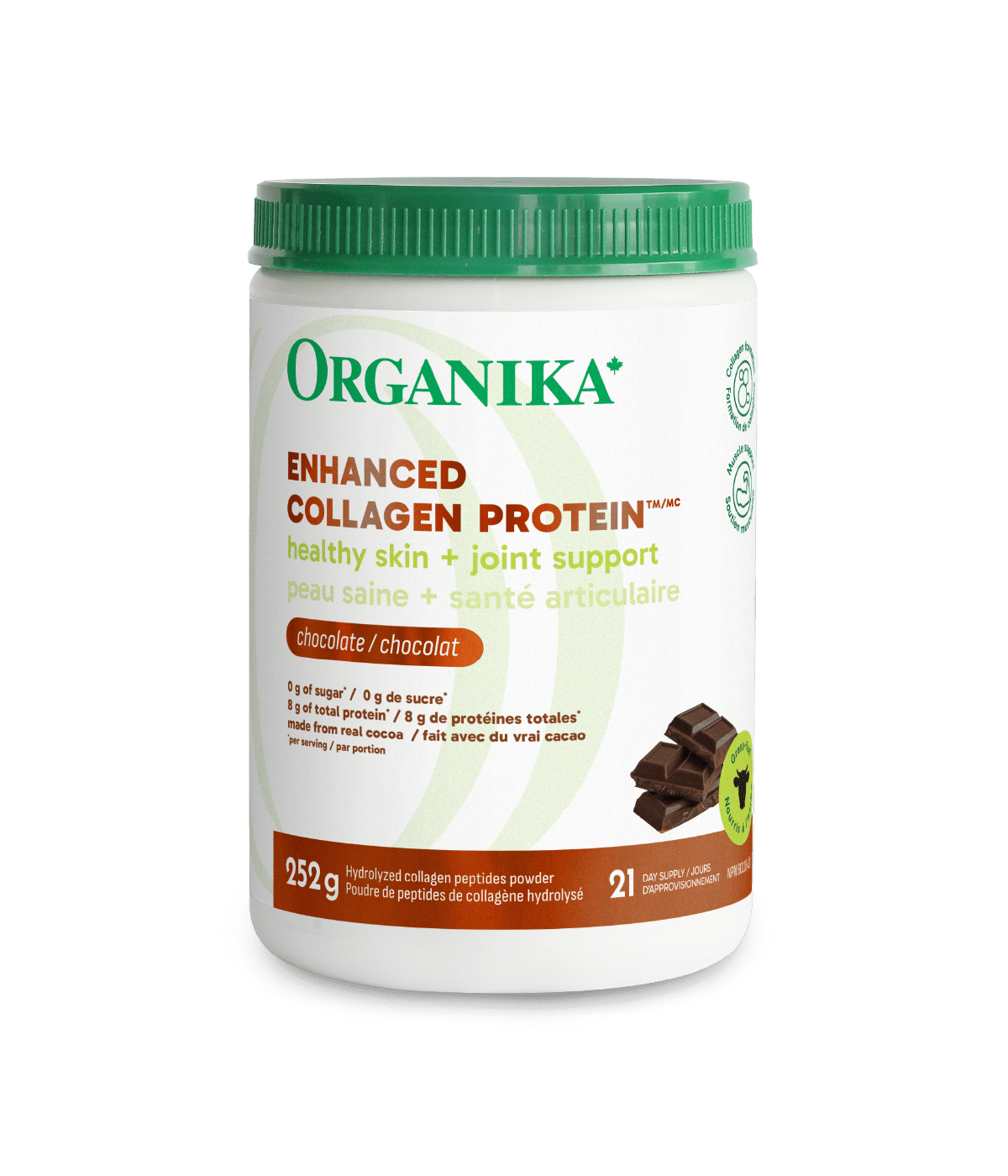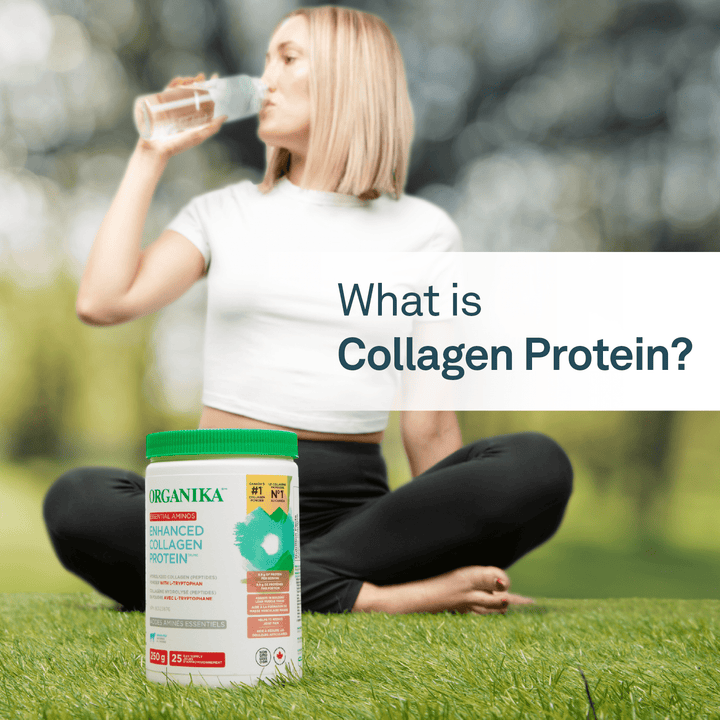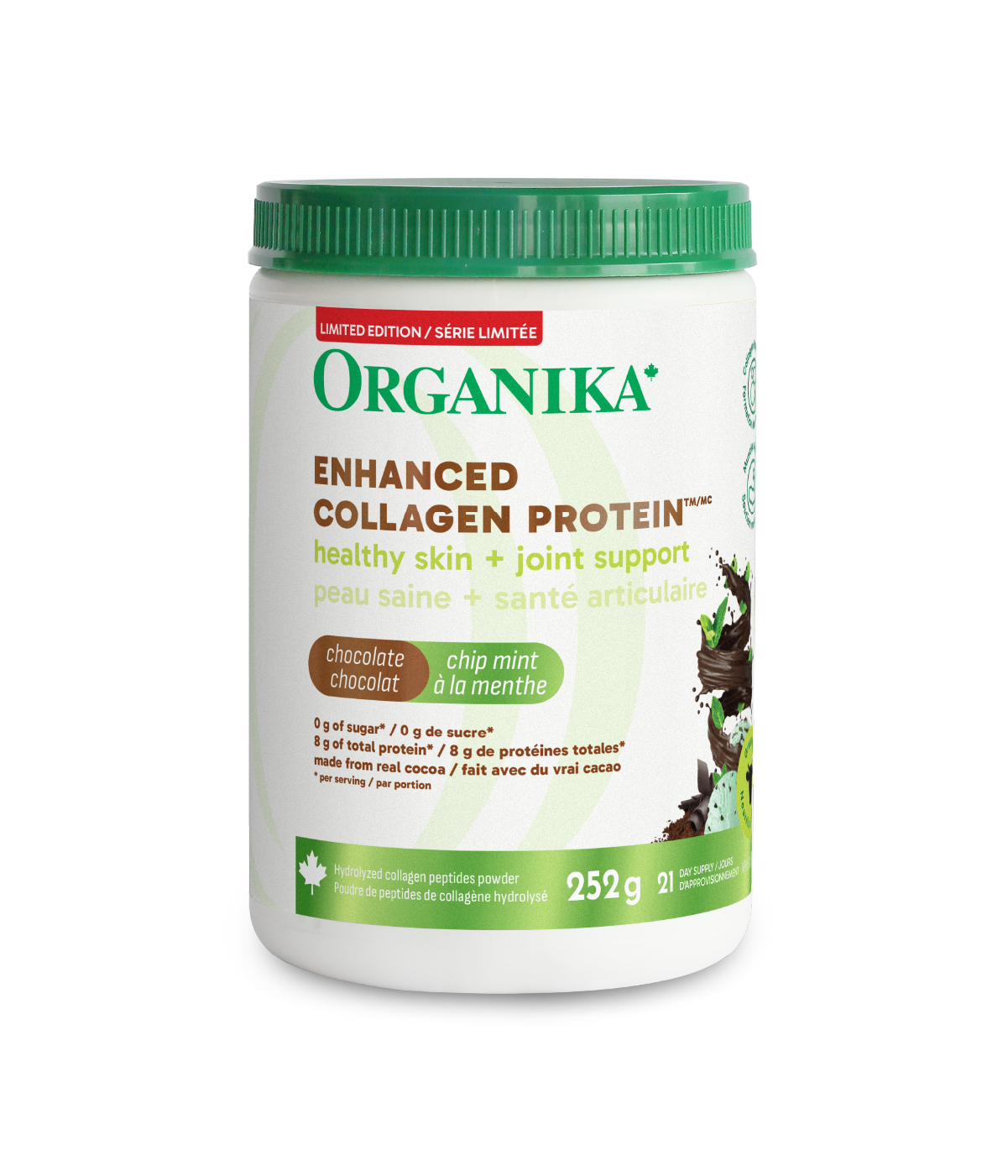
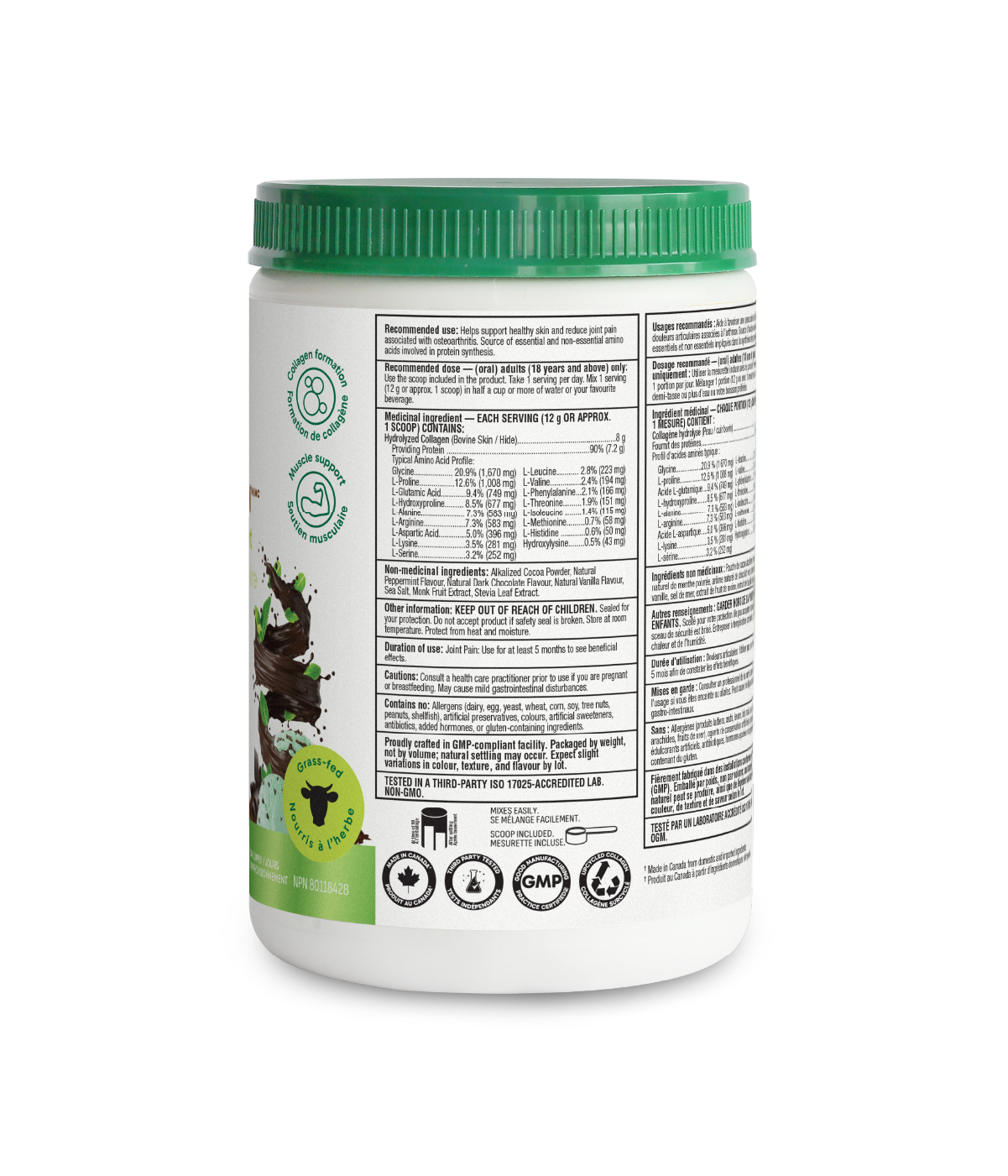
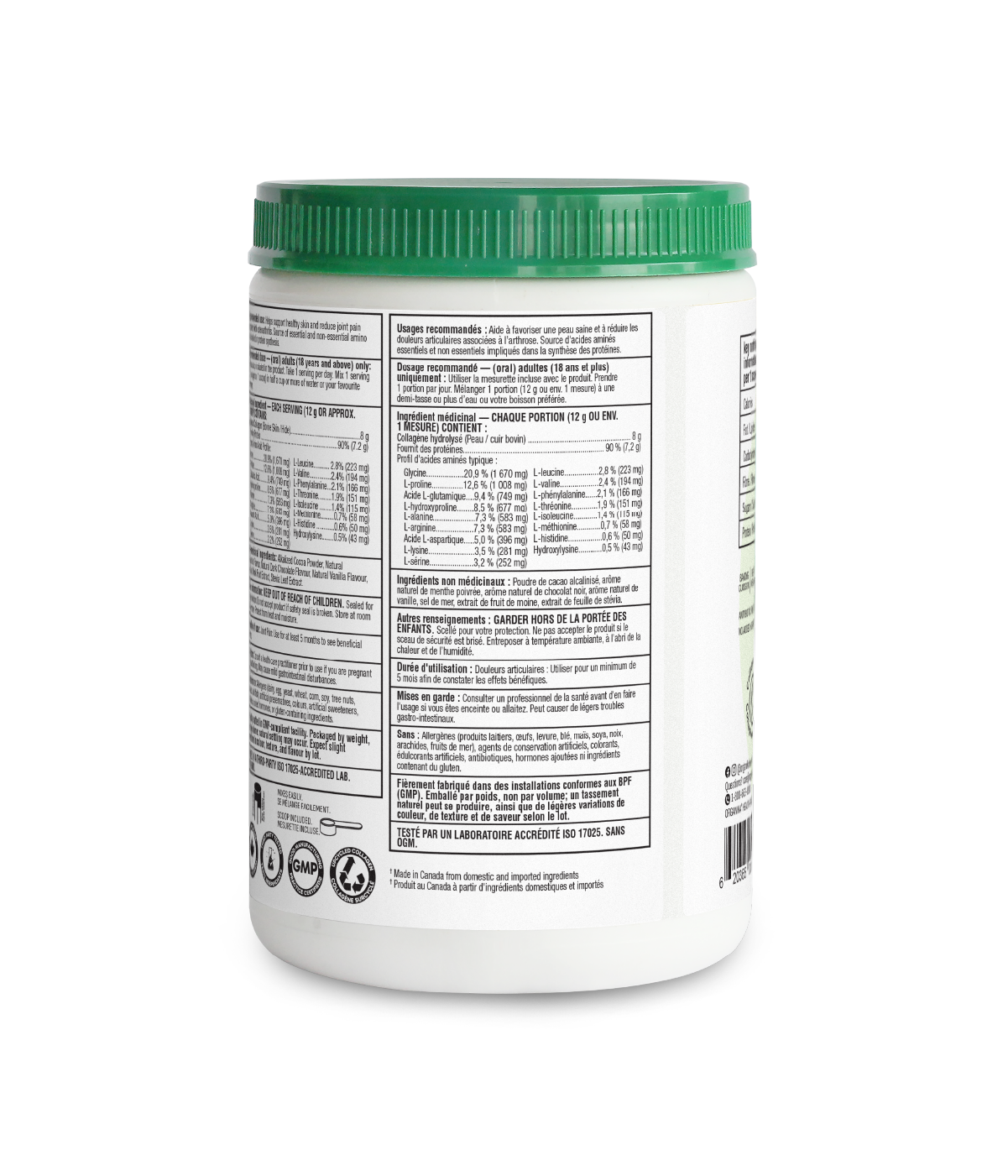
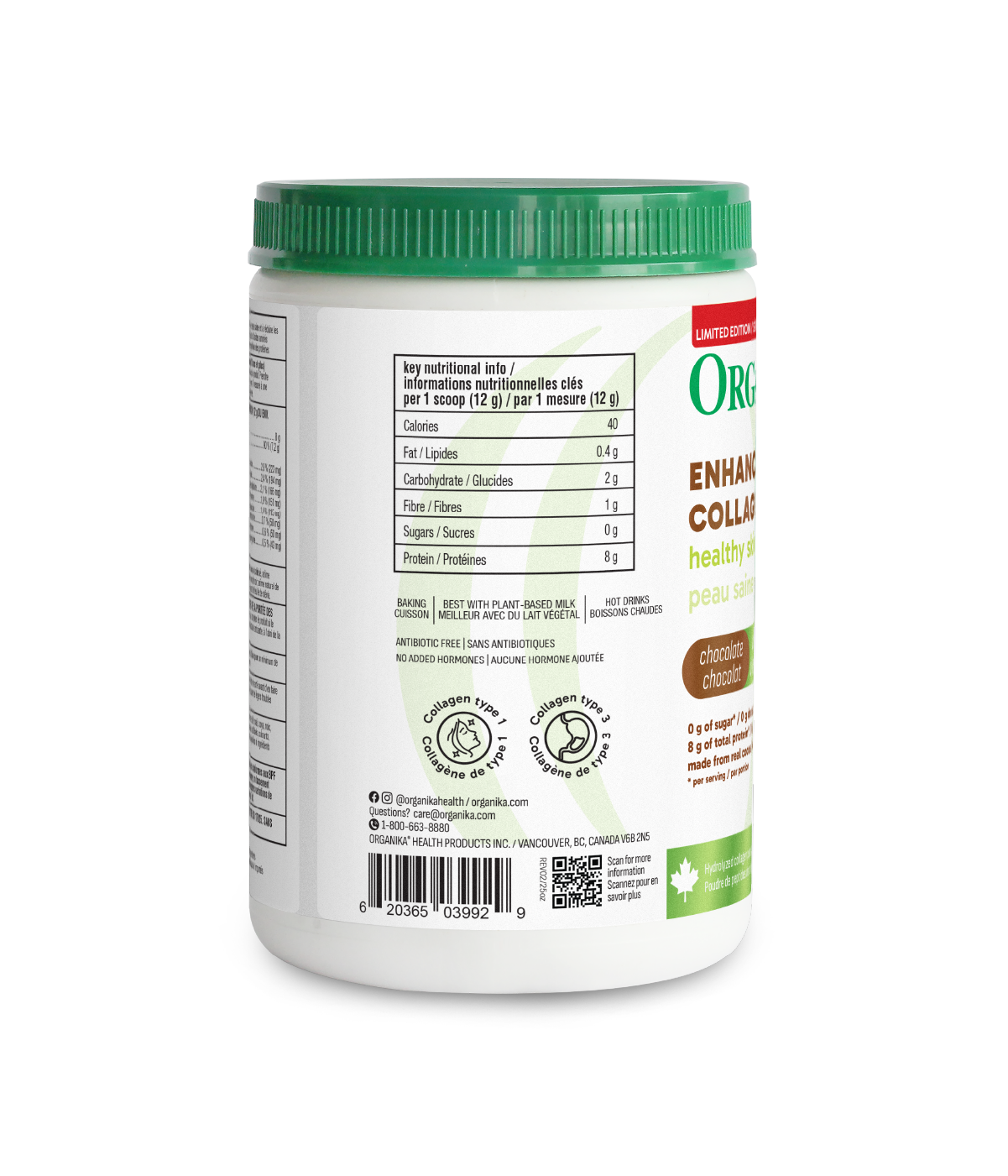




-
NewIs this right for you?

-


-


-

-

-

Dark Chocolate Chip Mint Enhanced Collagen Protein
Healthier skin, hair, nails, joints & gut in a Chocolate Chip Mint drink with 0 g sugar
- Promotes healthy skin, hair, and nails
- Helps reduce joint pain linked to osteoarthritis
- Supports bone density and healthy digestive linings
- 7.2 g protein per serving
- Naturally sweet, creamy and delicious—with 0 g sugar
Couldn't load pickup availability



Notify Me When Available
Enter your email and we'll let you know as soon as this product is back
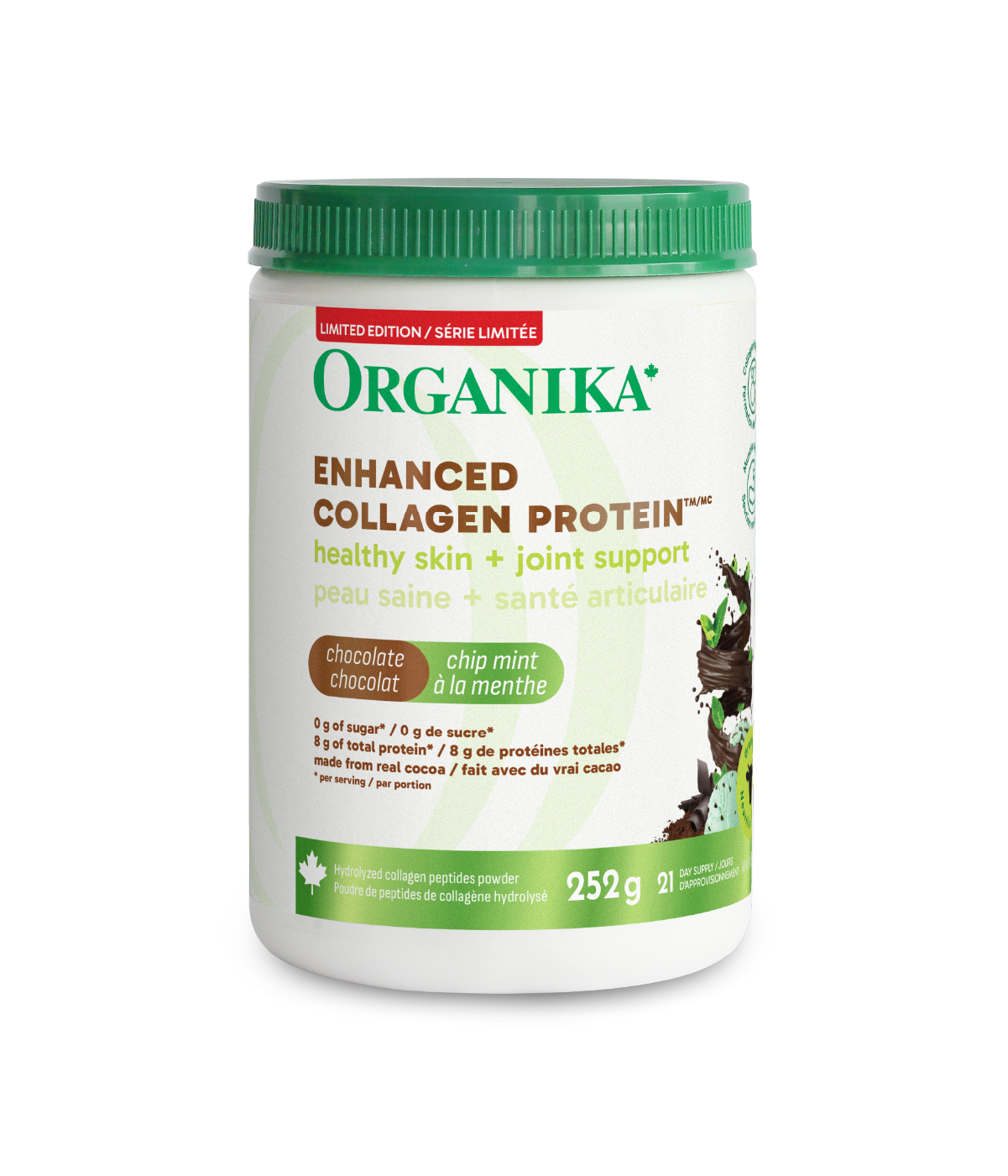
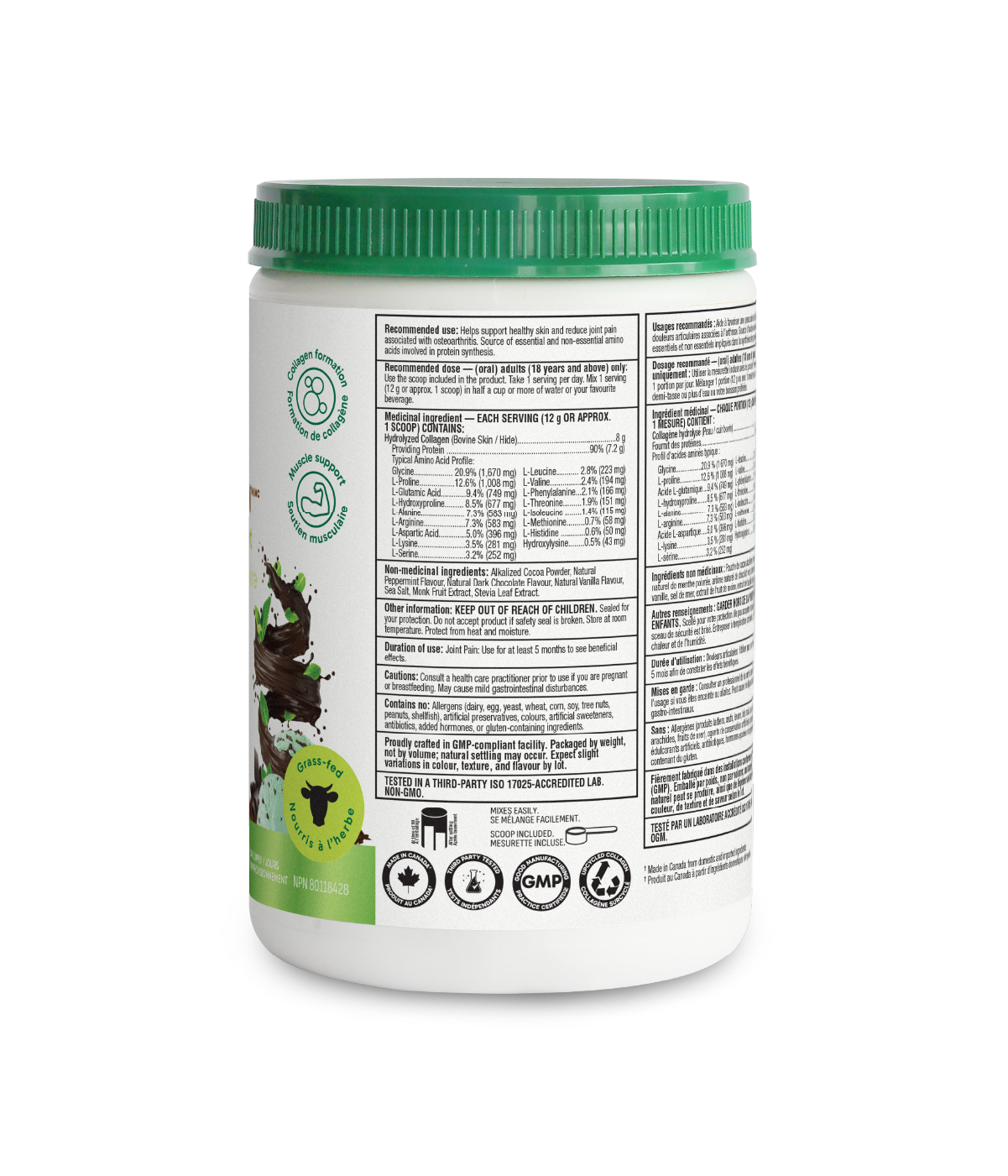
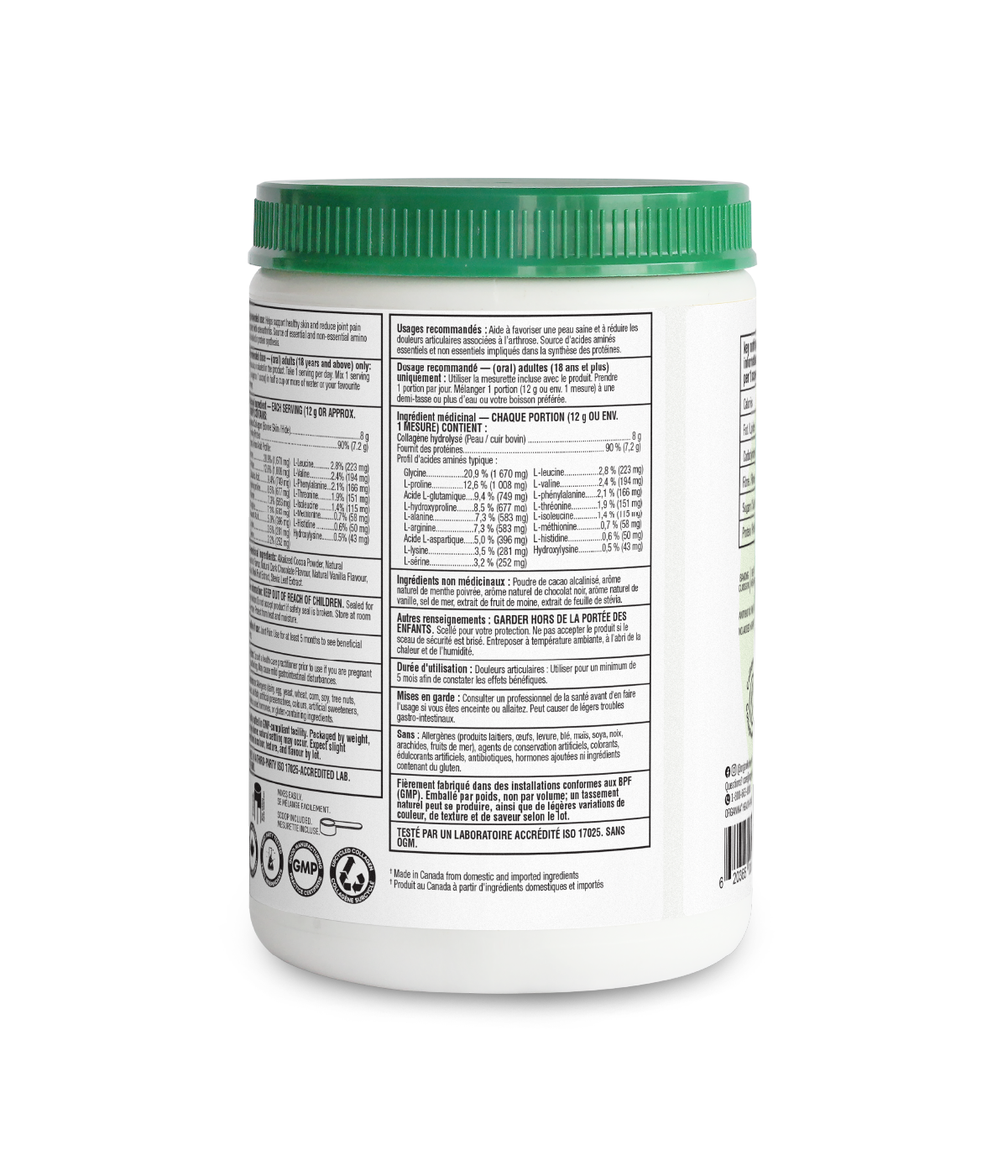
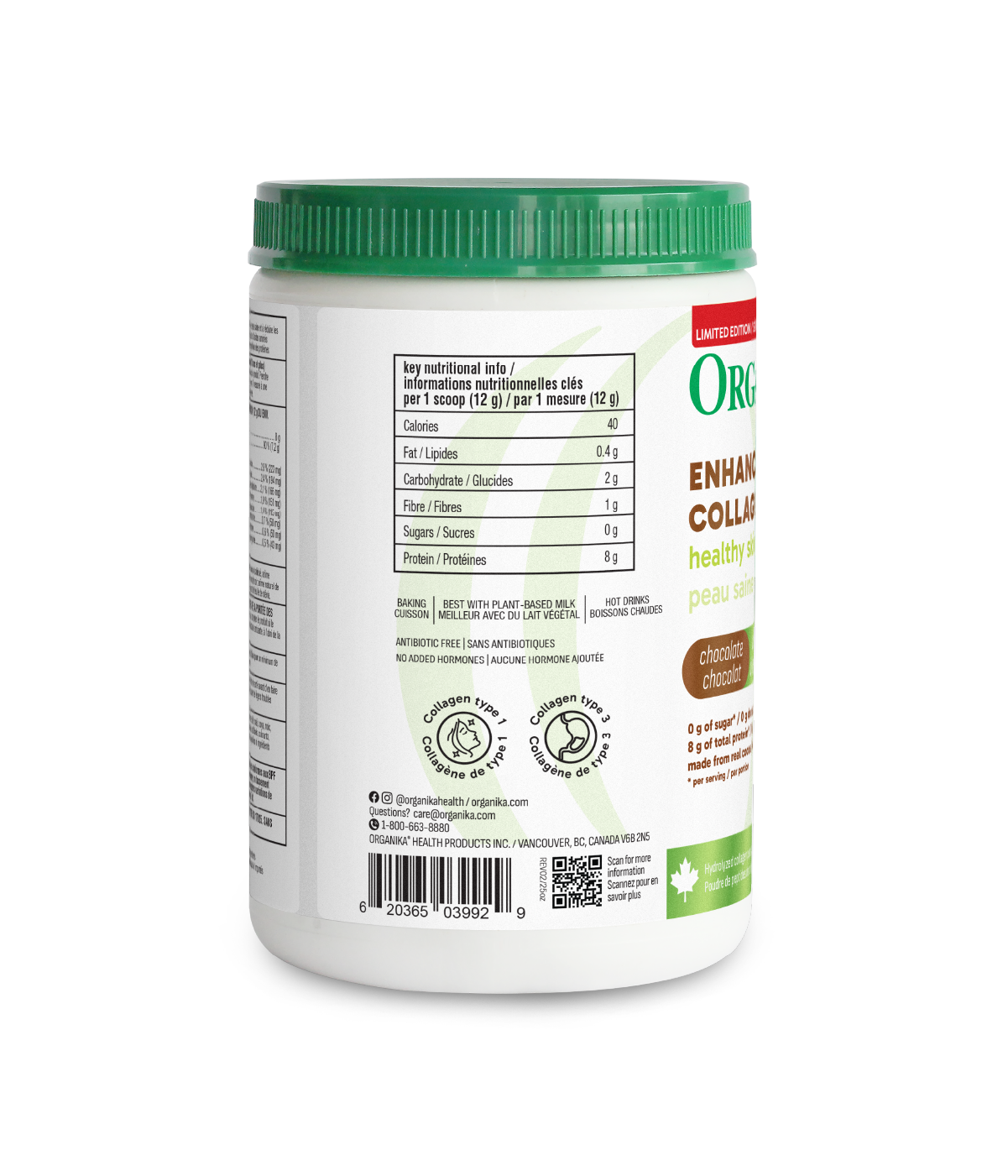




Supplement Facts




Ingredients & Nutrition
MEDICINAL INGREDIENTS - EACH SERVING (12 g OR APPROX. 1 SCOOP) CONTAINS: Hydrolyzed Collagen (Bovine Skin / Hide) 7.2 g
NON-MEDICINAL INGREDIENTS: Alkalized Cocoa Powder, Natural Peppermint Flavour, Natural Dark Chocolate Flavour, Natural Vanilla Flavour, Sea Salt, Monk Fruit Extract, Stevia Leaf Extract.

Is This Right for You?
Looking for a single-ingredient collagen?
Do you want a collagen that makes for a delicious drink?
Want support for joints, skin and muscle?
Looking for a collagen tastes great?
Dealing with joint stiffness?
Wishing you had healthier skin?
If you answered "yes" to any of the above, this product is right for you.

-
Naturally sweet, creamy and delicious—with 0 g sugar
-
Supports bone density and healthy digestive linings
Ingredients & Nutrition
Recommend For
Looking for a single-ingredient collagen?
Do you want a collagen that makes for a delicious drink?
Want support for joints, skin and muscle?
Looking for a collagen tastes great?
Dealing with joint stiffness?
Wishing you had healthier skin?
If you answered "yes" to any of the above, this product is right for you.
Gluten-Free
Egg-Free
No Preservatives
Non-GMO
Dairy-Free
No Artificial Colours or Flavours
A delicious chocolate mint collagen powder that supports joint comfort, skin health and protein synthesis without added fillers


The Full Scoop

-
Naturally sweet, creamy and delicious—with 0 g sugar
-
Supports bone density and healthy digestive linings
This Dark Chocolate Chip Mint flavoured collagen powder supports protein synthesis, skin health and joint function, and is sourced for quality and formulated without additives. Each serving includes 7.2 g of protein with essential and non-essential amino acids. This includes lysine to support collagen formation, glycine and proline for connective tissue repair and branched-chain aminos to help maintain muscle mass. Taken daily, this collagen helps reduce joint pain associated with osteoarthritis and supports the structure and appearance of healthy skin.
Oh, and did we mention it's made with Canada's #1 Collagen Powder?
Ask Away
We’ve got the FAQs covered. But if you’re still stuck, we’re only a message away.
Get in TouchCan I mix this with water, or is it best with milk alternatives?
It’s fine to mix with water; however, for the best flavour and results, it’s recommended to use milk alternatives.
Is this product safe to use during pregnancy or breastfeeding?
It should be safe, but it’s always best to consult a healthcare professional before use.
Are there any allergens in this formula?
Certain ingredients, such as cloves, cinnamon, and cocoa, may be a concern for some individuals.
How long should I take this product to see results for joint health?
It’s recommended to use the product for at least five months to see results.
Does this product contain any added sugar or artificial sweeteners?
No, it does not contain any added sugar or artificial sweeteners.
Is this collagen hydrolyzed, and what does that mean?
Yes, it is hydrolyzed. Hydrolyzed collagen means the collagen has been broken down into smaller peptides and amino acids, making it more bioavailable, easier to absorb, and simpler to mix with liquids.
Can I take this collagen daily?
Absolutely!
What’s the best time of day to consume this product?
There’s no specific time of day to enjoy this product. Think of it like a flavoured hot chocolate—it’s perfect as a comforting drink in the evening.
Can I take this product with other supplements or medication?
Absolutely!
You'll Likely Also Love...
Dark Chocolate Pumpkin Spice Enhanced Collagen Protein
Healthier skin, hair, nails, joints & gut in a Dark Chocolate Pumpkin Spice drink with 0 g sugar
Lychee Enhanced Collagen Protein
Lychee flavoured collagen for healthier skin, hair, nails, joints, and gut
Dark Chocolate Chip Mint Enhanced Collagen Protein
Healthier skin, hair, nails, joints & gut in a Chocolate Caramel Macchiato drink with 0 g sugar
Enhanced Collagen Protein Chocolate
Healthier skin, hair, nails, joints & gut in a chocolatey drink with 0 g sugar
Support Beyond Products
Collagen 101: What is Collagen Protein? You’ve probably heard all the buzz surrounding collagen, yet may still be asking yourself: what IS collagen really? You’re not alone, and we’re here to make it easy for you to understand. Collagen is the most plentiful form of protein in your body, and acts like the “glue” that holds it all together. That’s right, our bodies naturally produce collagen. Collagen contributes to elasticity, strength, and tone throughout the body. Unfortunately, as we age, our collagen production starts to decline. Collagen production declines even faster due to excess sun exposure, smoking, excess alcohol, and lack of sleep and exercise. But fear not, that’s where collagen supplementation comes to play. What are the benefits of collagen? Collagen Protein has many benefits, ranging from supporting your hair, skin and nails, to gut health and bone and joint support. Hair, Skin and Nail Health: Collagen helps increase the elasticity and moisture of your skin, while also reducing UVB damage and signs of photoaging. You can forgive yourself for many years of not wearing sunscreen outside. Bone and Joint Health: Collagen helps maintain healthy cartilage in the joints, improving function and reducing symptoms of joint pain associated with osteoarthritis. Gut Health: Collagen provides your body with the amino acid, L-Glutamine, which is essential in supporting your gut lining. Collagen Protein vs. Protein Powder: Is there a difference? Although Collagen Protein and Protein Powder are sometimes used interchangeably, they are different. The main difference involves their amino acid breakdown. Let’s go back to science class, shall we? Amino acids are the building blocks of proteins. They are required for many critical roles in your body, such as building proteins, hormone function, and neurotransmitters. Amino acids are categorized between essential and non-essential amino acids. This is where collagen gets involved. There's a total of 20 amino acids, 9 of which are essential. This means, our bodies cannot produce them on our own and need to be consumed through either diet or supplementation. Some easy ways to consume these 9 essential amino acids through diet include meat, eggs, poultry, edamame, or tofu. What about collagen? Collagen protein only contains 8 out of the 9 essential amino acids, considering it to be an “incomplete protein”. Protein Powders are typically formulated with all 9 essential amino acids, considering them to be a “complete protein”. While our Enhanced Collagen Original only has 8 of the 9 essential amino acids, our Essential Aminos Enhanced Collagen Protein has all 9 essential amino acids, which is a “complete protein”. Whether you choose to consume Enhanced Collagen Original or Essential Aminos Enhanced Collagen Protein depends on what your goals are. You will still reap the benefits collagen has to offer, but Essential Aminos Enhanced Collagen Protein is particularly beneficial if you are focused on your protein consumption, or the growth of lean muscle mass. Is collagen right for you? Whatever your goals are, we have collagen that’s right for you. It’s simple, just choose the one that fits your lifestyle. If you’re looking to start off with the basics, try our award-winning, Enhanced Collagen Original (psssst, it’s Canada’s #1 selling Collagen Powder). OR Are you looking to combine your collagen with other supplements? Choose from a variety of our multi-benefit blends like Enhanced Collagen Pure Beauty, Enhanced Collagen Bone and Joint, or Metaboost Fat Metabolizing Complex Powder. Are you pescatarian or vegetarian? We have options for you too. Do you want to have ALL sources of collagen in one? We have you covered. Do you want to make taking collagen fun? Choose from a variety of our flavoured options, from lemon to chocolate. The bottom line – collagen supplementation is particularly beneficial as you age, to support your hair, skin, nails, bones, joints, and gut health. Whatever your goals are, we have a collagen for you. References https://www.hsph.harvard.edu/nutritionsource/collagen/#:~:text=Collagen%20is%20the%20most%20abundant,muscles%2C%20tendons%2C%20and%20cartilage. https://www.healthline.com/nutrition/essential-amino-acids
read moreToday, interest in dietary collagen is growing at a rapid rate, and for good reason. I started taking collagen three years ago, and some pretty remarkable things have happened. The benefits of a collagen-rich diet are incredible, ranging from better weight control, improved digestion, clearer skin, reduced inflammation, and improved immune function.1 In my practice, collagen has become a game changer for injury recovery. I recommend it daily to patients dealing with ligament, tendon, cartilage, or joint problems.2 It works that well. Collagen based products provide a unique blend of amino acids that are critical for everyone, regardless of age. If you don’t get enough collagen in your diet you can experience an increase in injuries, digestive issues, and other symptoms associated with aging (decreased bone mineral density, wrinkles, and arthritis).3 Is collagen good for men? Absolutely - Collagen is a protein your body produces naturally and is a major component of skin, bone, and connective tissue.2 Let’s examine why this is not only a safe, but critical supplement to consider. 5 Surprising Benefits of Collagen for men 1. Bulletproof bones and joints The cartilage and space between your joints acts like a cushion to absorb shock and force. But aging, arthritis, sports injuries, and collagen deficiency can compromise this cushioning effect.2 The breakdown of this system can lead to pain and debility. The good news is that collagen has a protective effect on cartilage and provides pain relief.3 It is highly effective for those that live an active life and push their bodies to the limit. For the last three years collagen has been a staple in my post workout shake. As a result, I feel better now at age 35 than I did at 27. 2. Helps you grow strong and thick hair Your hair, skin, and nails are made up primarily of the protein keratin.4 Increasing your collagen intake provides your body with the raw materials needed to build keratin leading to stronger hair and nails. Other nutrients to consider for hair loss are Vitamin A, Vitamin D, zinc, selenium, iron, and thyroid hormone levels.5 Along with collagen, these micronutrients are key to growing thick, strong hair. 3. Boosts muscle recovery If you love working out, building muscle, and want to improve your recovery time between sessions - collagen can help.6 Muscles, tendons, ligaments, and cartilage are all stressed during workouts. Since collagen makes up 30% of the proteins in our body, we can directly supports our recovery and repair process by making sure we get lots of it in our diet and through supplementation.7 4. Promotes gut health Collagen is essential to heal and seal your gut.8 The lining of our intestines acts like a screen door that filters out large particles and absorbs small molecules like simple sugars, amino acids, and fats. If the intestinal lining is compromised or leaky, you open yourself up to a wide array of health concerns and digestive distress. When undigested food and toxins creep in, it leads to inflammation, immune system dysregulation, sleep problems, and chronic digestive complaints. Collagen provides your intestinal cells with the amino acids glycine and proline which are essential in rebuilding the lining of your digestive tract.8 Glycine also helps reduce inflammation which is common in those that suffer from Irritable Bowel Syndrome. 5. Improves heart health Collagen provides structural support to the cardiovascular and circulatory system. Without sufficient collagen, the vessels that carry blood around your body become weak and fragile.9 Collagen supplementation has been shown to lead to a significant reduction in arterial stiffness.10 Collagen powder and peptides for men When choosing the right collagen product there are a few things to keep in mind. Look for free range and antibiotic free animals as the collagen source. Check for third party certifications that indicate proper quality and purity. Avoid products that blend in other ingredients with collagen such as probiotics or fiber because we don’t have enough data to see how they interact. On the label, look for either collagen hydrolysate, hydrolyzed collagen, or collagen peptides - this indicates the collagen has been broken down into small enough particles that are easily absorbed. Collagen supplements for men Restore and rebuild collagen with Organika’s Enhanced Collagen flavourless hydrolyzed collagen powder. Peptides are short chain amino acids naturally derived from collagen protein. These natural peptides are highly bio-available, digestible and soluble. Sourced from grass-fed cows, Enhanced Collagen is rBGH & BSE-free (no antibiotics or hormones), with no artificial sweeteners or GMO ingredients. Amino acids glycine, lysine & proline revitalize, firm and smooth skin. Shop Enhanced Collagen References https://www.ncbi.nlm.nih.gov/pmc/articles/PMC7271718/ https://pubmed.ncbi.nlm.nih.gov/18416885/ http://www.scielo.br/pdf/rbgg/v19n1/1809-9823-rbgg-19-01-00153.pdf https://pubmed.ncbi.nlm.nih.gov/23949208/ https://pubmed.ncbi.nlm.nih.gov/30547302/ https://www.ncbi.nlm.nih.gov/pmc/articles/PMC3177172/ https://www.ncbi.nlm.nih.gov/pmc/articles/PMC3003457/ https://pubmed.ncbi.nlm.nih.gov/28174772/ https://www.ncbi.nlm.nih.gov/pmc/articles/PMC5429168/ https://www.ncbi.nlm.nih.gov/books/NBK21582/ Axe, J. The Collagen Diet. 2019.
read moreWhat you need to know about collagen’s role in muscle mass. You may have heard that collagen is the most abundant protein in the human body and is a key component of all connective and fibrous tissue, including muscle, bone, cartilage, tendons, ligaments, blood vessels, hair, and skin (1). Collagen is vital for muscle health, because it accounts for up to 10% of the total mass of skeletal muscle tissue in the body (2). Because working out involves increasing muscle mass, let’s explore why collagen becomes important. Does collagen play a role in exercise? We have long understood that exercise causes stress and micro-trauma to working muscles and connective tissue (tendons, ligaments, fascia, etc.). The higher intensity the exercise, the higher the impact on the muscles. This micro-trauma is necessary and valuable; it is the primary driver that directs the body to build more muscle mass and to increase strength. However, repair of micro-trauma, and increasing muscle mass and strength is only possible if the correct protein and amino acid building blocks are available in adequate amounts. Extensive research has shown that ensuring adequate protein intake has a large positive impact on muscle repair and growth (3). What amino acids do you need for muscle growth? The essential amino acids most required for muscle growth and repair are leucine, isoleucine, valine and glutamine, all of which are found in all animal sources of collagen (4). As a great animal-based source of protein, collagen is a helpful addition to an athlete’s diet. Research comparing the use of animal and plant-based sources of protein in athletes has shown that equivalent amounts of a carbohydrate or soy-based protein supplement does not have as marked of an impact as animal-based protein on post-workout muscle building (5). Collagen is also high in the amino acids proline and glycine, which are particularly important for the strengthening and repair of tendons and ligaments. They may also help decrease the likelihood of exercise-induced injury (3). Collagen increases muscle with training. The research has found that collagen peptide supplementation in combination with resistance training has helped body composition by both increasing muscle strength and the loss in fat mass (7)(8). So whether you are working out for weight loss, or increasing muscle mass, supplementing with collagen can make a big difference than when just resistance training alone (9). How can I incorporate collagen into my post-workout routine? The standard daily protein requirements for most people are 1-1.5g/kg of body weight per day, although research shows increasing it up to 1.6-2.0g/kg per day can be beneficial in individuals doing more significant resistance training. It’s important to remember that many people, these days, are mindful of increasing their protein intake. When adequate daily protein is consumed, research shows that a moderate post-workout dose of protein is sufficient to promote muscle repair. Studies vary, but the suggested dose is between 6 and 20g of protein, taken 1-3 hours post workout (6). NOTE: You don’t need to be a high-level athlete in order to benefit from collagen supplementation. Organika's Enhanced Collagen Original or a Plant-Based Collagen Booster are excellent sources of amino acids. When used in combination with a whole foods diet including high quality protein, collagen is useful for anyone who is trying to build muscle, enhance their recovery and prevent injury. Dr. Jessica Eastman is a licensed and registered Naturopathic Doctor in clinical practice in Vancouver BC, an experienced faculty member at the Institute of Holistic Nutrition, and the founder of Thrive Clinical Mentorship. Jessica strongly believes in integrative medicine and the value of a supportive community where patients, clients and clinicians can work together. REFERENCES Sibilla, S., Godfrey, M., Brewer, S., Budh-Raja, A., & Genovese, L. (2015). An overview of the beneficial effects of hydrolysed collagen as a nutraceutical on skin properties: Scientific background and clinical studies. The Open Nutraceuticals Journal, 8(1), 29-42. Gillies, A., Lieber, R. (2011). Structure and function of the skeletal muscle extracellular matrix. Muscle Nerve, 44(3): 318-331. Wells, D. (2009). The post-workout protein puzzle: which protein packs the most punch? Strength and Conditioning Journal, 31(1): 27-30. Gauza-Wiodarczyk, M., Kubisz, L., Wiodarczyk, D. (2017). Amino acid composition in determination of collagen origin and assessment of physical factors effects. International Journal of Biological Macromolecules, 104(Pt A):987-991. Philips, S. (2011). The science of muscle hypertrophy: making dietary protein count. Proceedings of the Nutrition Society, 70(1): 100-103. Schoenfeld, BJ., Aragon, AA., Krieger, JW. (2013). The effect of protein timing on muscle strength and hypertrophy. Journal of the International Society of Sports Nutrition, 10(53). Zdzieblik D, Oesser S, Baumstark MW, Gollhofer A, König D. Collagen peptide supplementation in combination with resistance training improves body composition and increases muscle strength in elderly sarcopenic men: a randomised controlled trial. Br J Nutr. 2015 Oct 28;114(8):1237-45. Kirmse M, Oertzen-Hagemann V, de Marées M, Bloch W, Platen P. Prolonged Collagen Peptide Supplementation and Resistance Exercise Training Affects Body Composition in Recreationally Active Men. Nutrients. 2019 May 23;11(5):1154. Oertzen-Hagemann V, Kirmse M, Eggers B, Pfeiffer K, Marcus K, de Marées M, Platen P. Effects of 12 Weeks of Hypertrophy Resistance Exercise Training Combined with Collagen Peptide Supplementation on the Skeletal Muscle Proteome in Recreationally Active Men. Nutrients. 2019 May 14;11(5):1072.
read more





